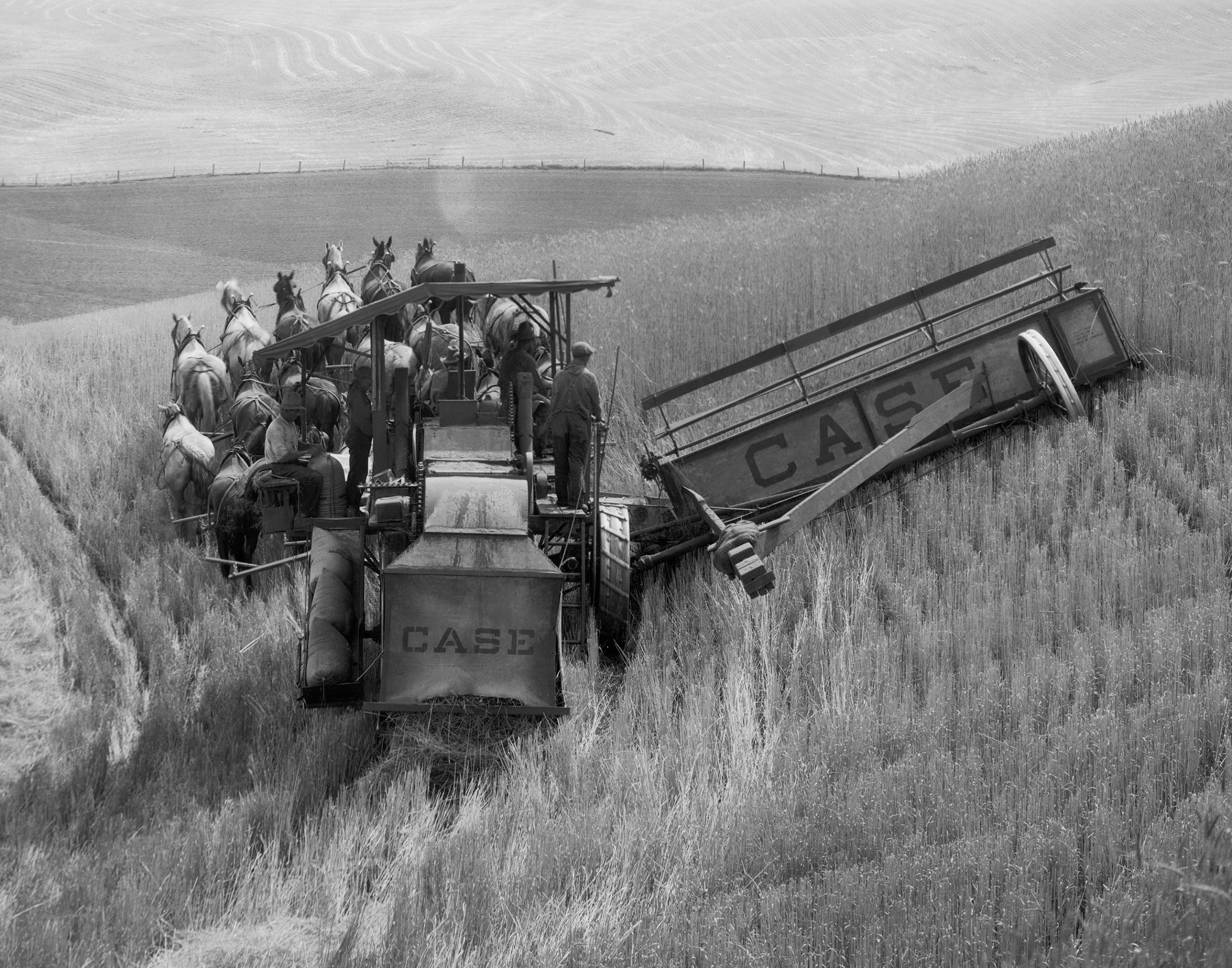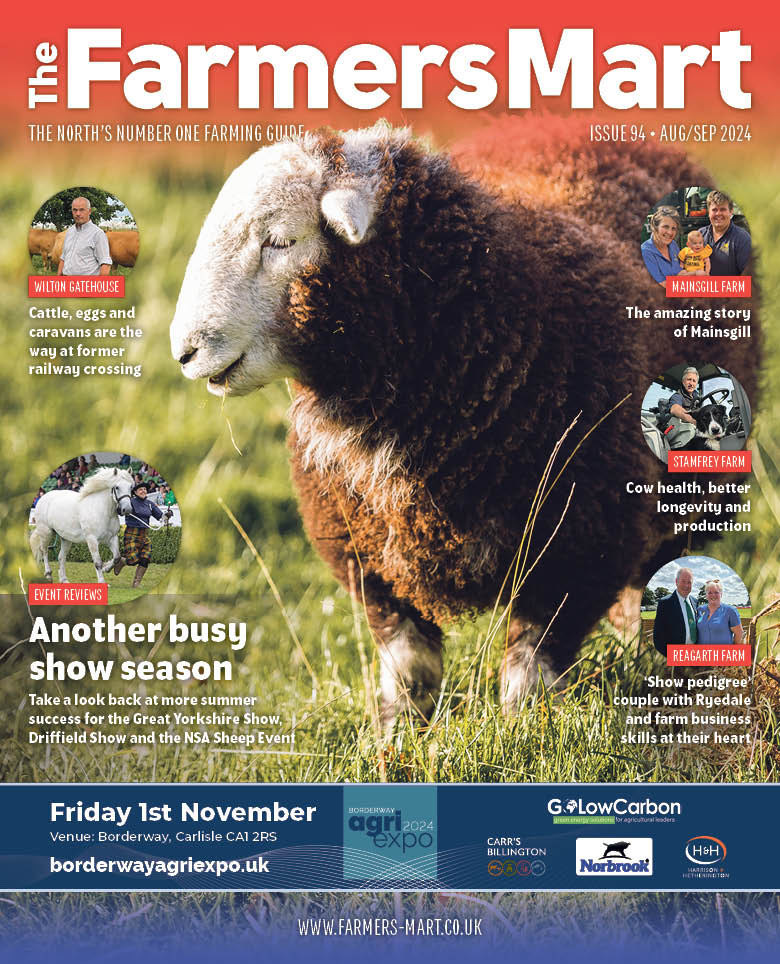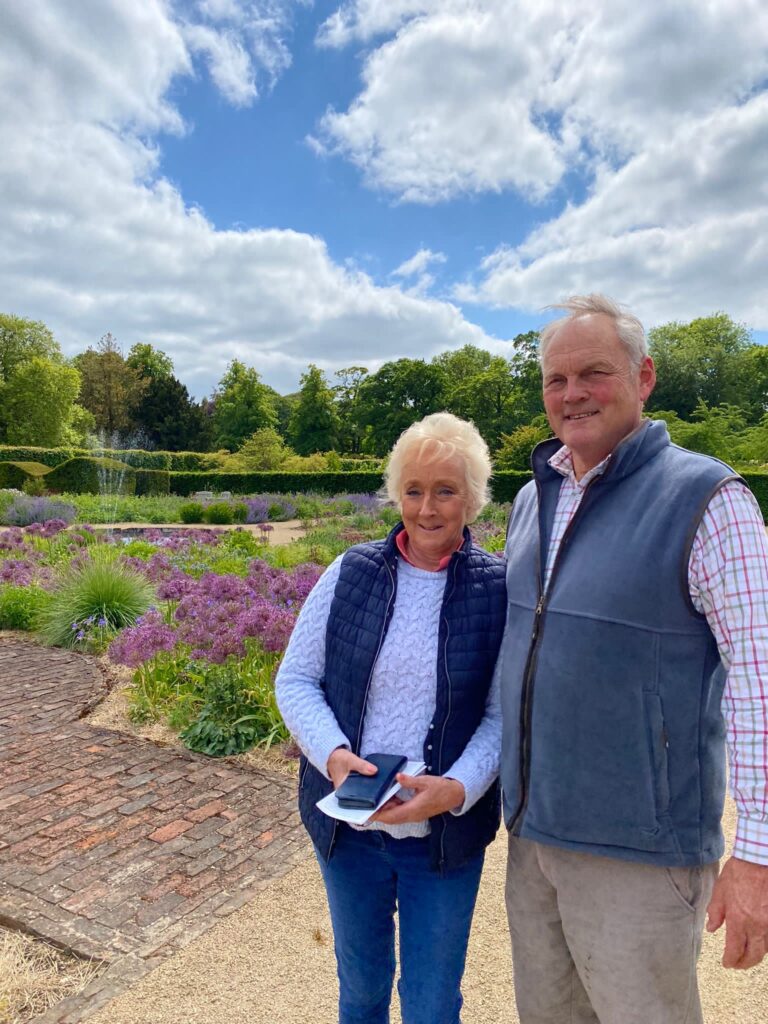 Chris Berry talks with farmer and ward councillor John Holtby of Skirlaugh.
Chris Berry talks with farmer and ward councillor John Holtby of Skirlaugh.
There are many farmers who incorporate several income strands to their overall business in order to ensure they are sustainable, and there are those who also find the time to get involved in wider community affairs too.
John Holtby of Dowthorpe Hall near Skirlaugh runs a largely arable concern that also includes land at Long Riston and that sees him farm a total acreage of just shy of 1000 acres, with traditional cropping of wheat, barley, oilseed rape and beans; a turkey business; pigs on a bed and breakfast arrangement; countryside stewardship agreements; some farm consultancy work and giving his time up for his rural locale as a ward councillor for the East Riding.
“We don’t own Dowthorpe Hall,” says John. “We rent it from The Crown. My great grandfather Thomas Holtby came here in 1890 and I’m the fourth generation. I came back to the farm in 1981 when in my mid-20s having had an early career in land agency. I still do a little bit of consultancy work for two or three other farmers in Newark and Scarborough.
“I don’t think it was ever set in stone that I would come back, but I always wanted to get involved in farming and when the opportunity came I took it. My father, Robert, started renting the other farm at Long Riston in about 1974, roughly 160 acres, and we now tenant 800 acres here at Dowthorpe which was more of a mixed farm when I was growing up and wasn’t quite as big as now.
“My father had a 250-sow herd of pigs taking pigs through to bacon. He also at some point had a small suckler cow herd and was involved in broiler chickens and eggs.
“When father decided he wanted to give up farming in 1981 and do other things I decided to come back up here, give up the land agency work I was doing in Nottinghamshire. Caroline and I married that same year and we’ve been here ever since.
“By then the sow herd had gone and there was no livestock on the farm. We used to grow a few potatoes at that point, but gradually people in Holderness moved out of them, so we became basically straightforward arable farmers and we have a pretty similar rotation to what we started with.
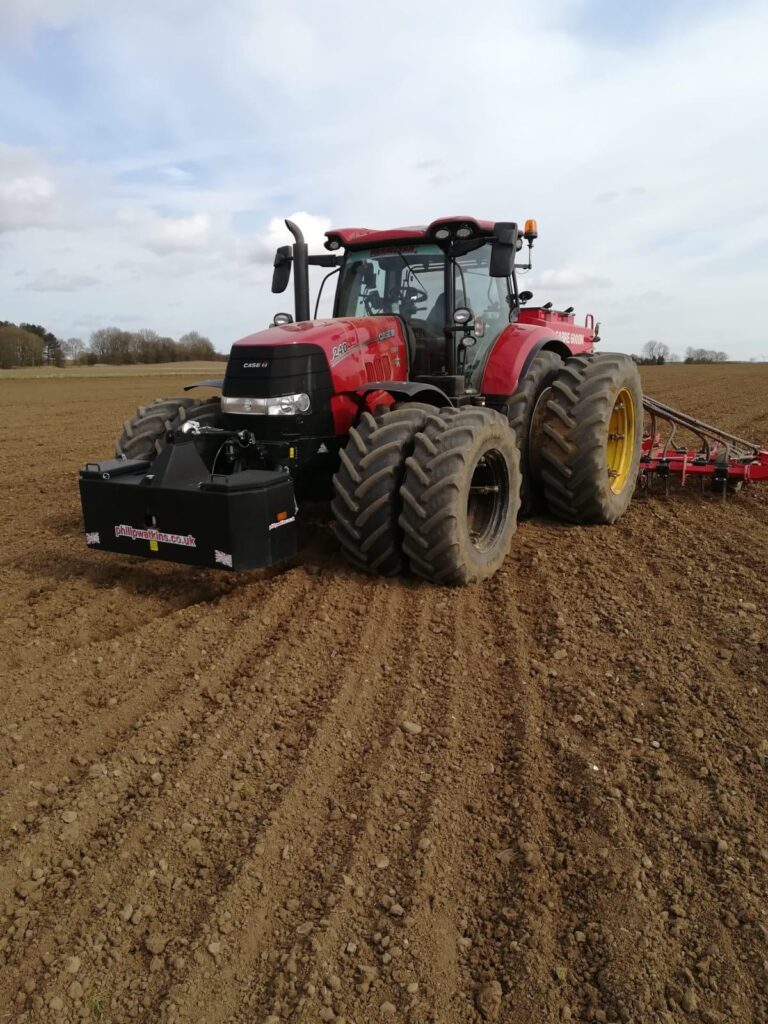 John says that, in common with many of his fellow farmers, this has been one of his most challenging winters for crop establishment and growth.
John says that, in common with many of his fellow farmers, this has been one of his most challenging winters for crop establishment and growth.
“I said to a friend the other day I never go out now because I can’t bear looking at it. Caroline said it has been the wettest she’s known it. I’ve never known it be so wet for so long and having started so early.
“Normally at this time of year we would have 450 acres of wheat; 160+ acres of oilseed rape, 130+ acres of beans and 100 acres of winter barley.
“During cultivation after harvest, we got most sown of what we were going to sow, bar a few headlands, but then what we sowed got a massive amount of rain immediately afterwards, so the fields are very patchy. Some look alright, some look pretty moderate.
“We had real troubles with rape, as we had big problems with flea beetle and had to redrill most of that. What we are left with is currently quite small and struggling with the wet and threequarters of what we redrilled has survived. If I get opportunity I might replace what we have lost with some spring oats.
“The barley looks absolutely fine. We drilled that quite early and ploughed it all. The land where we min-tilled and tried to be more regenerative looks the worst. We do much more min-till than we do ploughing these days because we generally see better improvement quicker and normally the results are good if not better.
This year’s varieties that John has growing currently are winter wheat varieties Graham, Champion, Parkin and Dawsum; winter barley variety Tardis; and Acacia rape.
“Our land type is predominantly loamy clay but varies a lot. Our current land condition is damp. While most of the lakes that formed have gone we can still see where they were and generally the crops look thin and are reluctant to get growing. We need sunshine and a bit of warmth.
“We can store and dry everything here – and at present it looks as though the dryer will be busy. Our main grain market is Vivergo in Hull as well as quite a lot going into Manor Farm Feeds and to Selby. Some goes to ForFarmers. I trade it all myself and have 4-5 merchants I deal with. All our wheat is feed wheat. We tend not to get the quality of milling wheat.
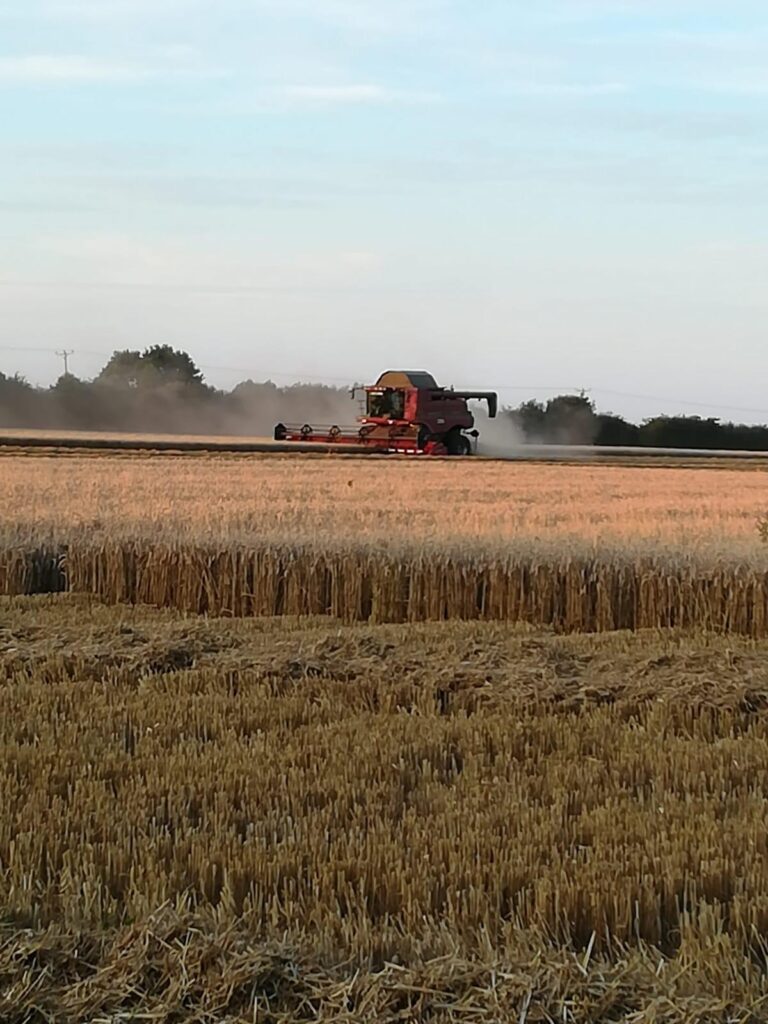 John says he’s now at a bit of a crossroads over whether to continue with oilseed rape in the future, echoing the sentiments of many others who have suffered due to flea beetle since the ban of neonicotinoids.
John says he’s now at a bit of a crossroads over whether to continue with oilseed rape in the future, echoing the sentiments of many others who have suffered due to flea beetle since the ban of neonicotinoids.
“If you can get it growing it’s fine and it’s a great break crop. but it’s getting harder and harder to get it under way in autumn. I’ve joined the SFI but haven’t gone for the crops that would replace it yet.
John faces a conundrum over not being convinced as yet about the benefits of growing crops such as wild bird cover and the fact that oilseed rape, when it grows well, being a good revenue stream even given the cost of production.
“The problem I see with growing such as wild bird cover and that kind of thing, which would be fine to a degree, I’m already in an HLS scheme anyway, is that while in theory the payments are great for growing them and it looks very easy, I’m slightly dubious about going into things that are actually difficult to grow, and say if we had an inspection and the crop isn’t there, through no fault of our own, are you going to get in trouble for it not being there? You’re also committed for 3 years.
“When you balance things out, it was only 18 months ago that rape was worth £900 per tonne, so presently I’m going to stick with it, but perhaps on a smaller scale.
“Our winter barley goes into animal feed mostly and we have quite a reasonable market for feed barley in our area.
While John hasn’t gone back into having a sow herd, pigs have returned to Dowthorpe on a bed and breakfast arrangement.
“I have Ashley Foster’s pigs. He’s from the North Frodingham area. I’ve had his pigs quite a long time now. We have around 1000 on at any one time.
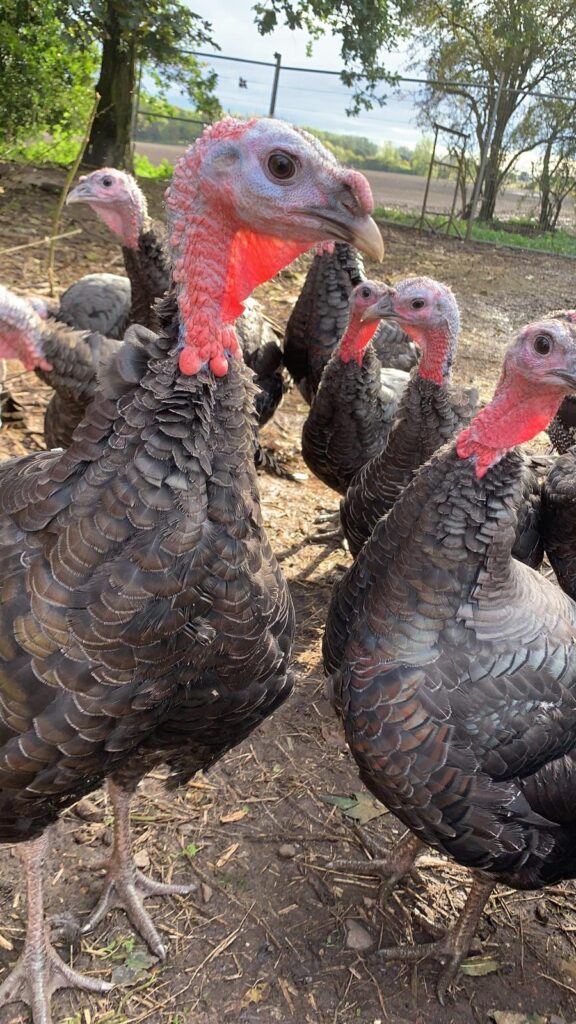 The turkey side of John’s farm business looks set for expansion in two regards, as he explains.
The turkey side of John’s farm business looks set for expansion in two regards, as he explains.
“We’ve been doing 250 turkeys for quite some time, but an opportunity has now come up as my fellow local turkey producer, John Wright of Wyton, is going out of turkeys.
“This should hopefully see our business nearly double, which is good news as our daughter Rosie came back home with her husband Henry two years ago. They are living on the farm now with their two little boys Arthur and Charlie and should provide an increased income for the farm at the right time. They are both currently studying their HND in agriculture at Bishop Burton College.
“Rosie will hopefully then be the third generation on a three generation tenancy with the Crown land. She’s also an accomplished artist with her own business providing paintings of people’s dogs and cats.
“Caroline and I also have a son George who didn’t want to get involved in agriculture, but Rosie said she’d like to give it a go.
John has always been a supporter of stewardship schemes, trying new ideas and environmental initiatives but feels that there are times when farmers are almost made to feel as though their experience of working the land is not seen as worthy compared to those in ivory towers.
“Farmers always take things on board and are always keen to learn, that’s been my experience, but I feel as a farmer that we’re rather talked down to by DEFRA, that they know better and know how to run farms better than we do.
“If there are easier and better ways to do things farmers are always going to do it. Farmers are very inventive people and are open to new ideas. We are certainly not stick in the mud types.
“I do feel that the current talk of regenerative farming as something new is a bit of a misnomer. It has been going on forever really, because if we didn’t regenerate we would leave the land dry and there would be nothing here.
“We are involved in environmental initiatives. We’re in an HLS scheme and SFI. We’ve a small amount of woodland and a major public footpath goes through the farm called the Trans Pennine Cycle Route, using an old railway line. We actually have quite a bit woodland either side of that.
“As part of our HLS agreement we have 70 acres that is not in production. It’s quite a big percentage and the Crown Estate has recently done a survey and they are quite keen to have all their farmers to have similar percentages in schemes.
“I’m keen to do all that stuff. I’ve always taken the view that if you have areas that are difficult to grow crops then you should take them out of production and take them into something useful for wildlife.
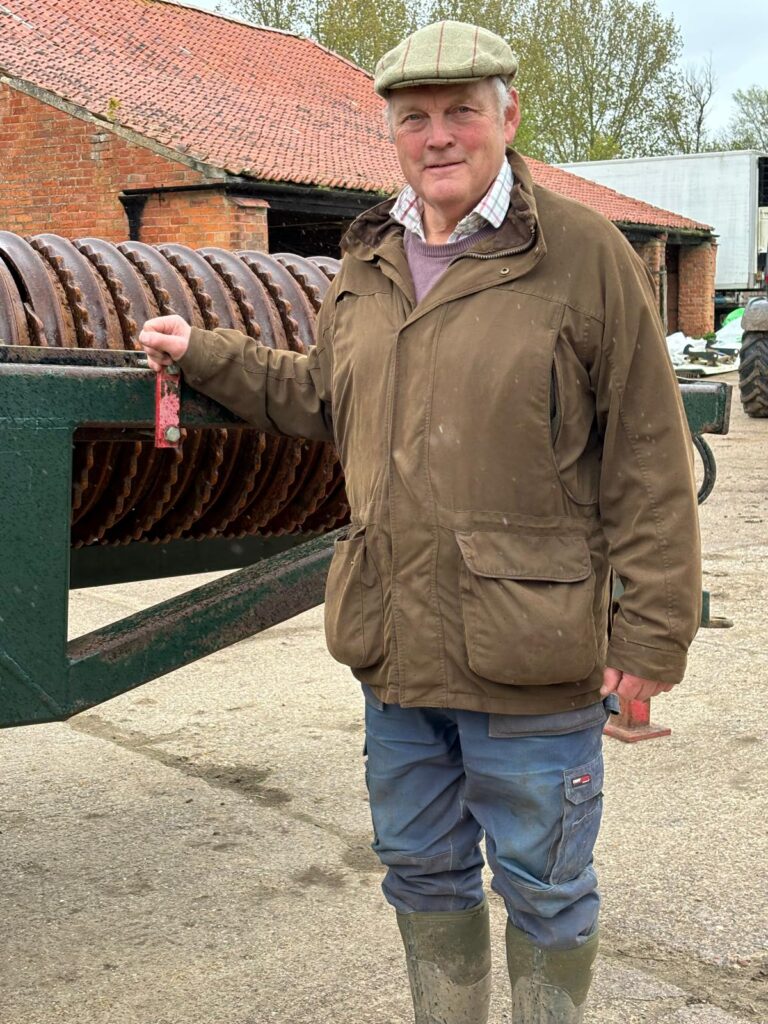 John has been a ward councillor for the East Riding for a number of years.
John has been a ward councillor for the East Riding for a number of years.
“My ward is Mid-Holderness that includes some big villages, Wawne on the edge of Hull, Skirlaugh and Aldbrough. It’s a big and largely rural area. I chair one of the scrutiny committees called Safer and Stronger and sit on various other committees.
“I’m a Conservative Party member. Until a year ago I was on the cabinet and deputy leader for a year, but it wasn’t really my bag because although I represent the Conservatives I’m not really politically minded. I’m quite central rather than left or right.
“At the moment the future looks pretty bleak for the Conservatives and if we’re being honest what’s gone on in Westminster doesn’t help any of us out in the shires, but I think most residents of East Riding will think the council has been reasonably well run since I started 1996. I don’t get many complaints. I think people are fed up with those at a higher level. That people haven’t been telling the truth and with a combination of Covid, the wars that are going on and the cost of living crisis people feel they want a change. Whether it will be any better I don’t know.
There’s a famous literary connection at Dowthorpe too. Winifred Holtby who wrote South Riding allegedly based some of her novel on the farm and John’s great grandfather.
“My great grandfather Thomas had a brother called David who farmed up at Rudston and had two daughters one of whom was Winifred, who was a good friend of my grandfather as they were of very similar age. Winifred spent quite a bit of time at Dowthorpe.


